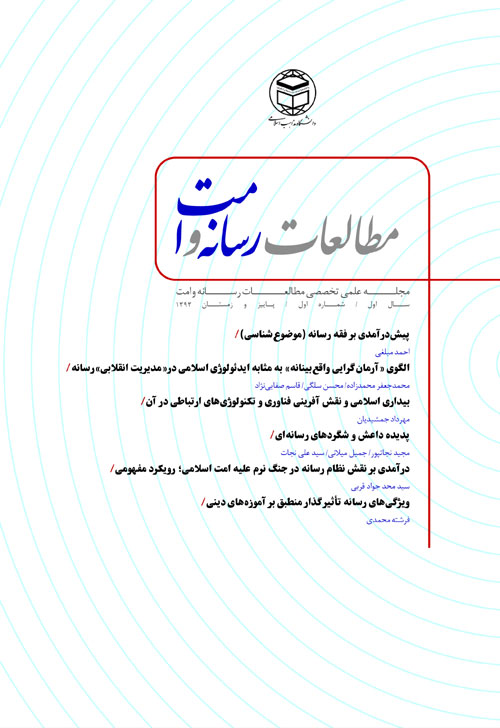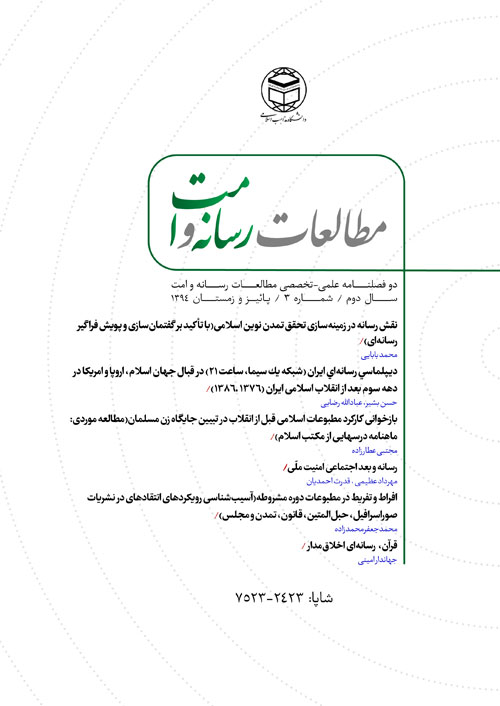فهرست مطالب

نشریه مطالعات رسانه و امت
پیاپی 1 (پاییز و زمستان 1393)
- تاریخ انتشار: 1393/10/25
- تعداد عناوین: 9
-
صفحه 5
-
صفحه 89
-
صفحه 152
-
Page 8Basically from a common perspective, jurisprudence expresses the provisions of the act of a responsible agent. From one point of view, the subjects of jurisprudential provisions can be divided into two categories: the act of a responsible agent and the issues related to the act of a responsible agent. The topic of media jurisprudence includes both. A responsible agent can be an individual, a community, or even the state (government). In media jurisprudence, a responsible agent is used in the sense of all the three mentioned above. Jurisprudence deals with three types of social issues and sets controlling regulations for them. These three types are: social issues in terms of nature, social issues in terms of potential impact, and social issues in terms of actual impact. The media belong to type three. In fact, whether we get close to it or not, it leaves its impact on us. Of course, the media encompasses all the three categories mentioned above since there are provisions that apply to it in terms of nature, there are potential effects in it that may prepare the ground for some jurisprudential provisions, and there are active effects in it too. The media are the greatest social issue in jurisprudence in the sense of an umbrella term that covers all social issues from religion, culture and art to economic, social, political and environmental factors. It may be correct to say that the media, without our permission or will and regardless of our getting close or not, leave a major impact on society. Therefore, it would not be possible to approach the problem of the media with a religious fatwa that stipulates not to approach it in the first place. Staying away from the media is futile since, on the one hand, we have no choice but to face it after all and, on the other hand, the media play a major role in weakening or strengthening religious beliefs and it is not possible to ignore its impact on religion. The humanness, prevalence, and inevitable impact of the media, its role in weakening or strengthening religious faith, and its impact on individuals and society are all the reasons why there is the need to interact with the media. Having said this, there are different approaches to the media such as the oversimplification of the media, prohibiting and avoiding the media, and the apocalyptic theory. Our attitude toward religion, the impact of the media on society, and these different approaches compels us to look at it from a jurisprudential perspective in order to determine our relation with the media. That is what forms a literature of “media jurisprudence”. For such an analysis, it is necessary to go through four stages: 1.typology; 2. religious and rhetorical theorization of the media; 3. jurisprudential theorization of the media legal theory; and, 4. Jurisprudential provisions.Keywords: media jurisprudence, typology, foresight, social jurisprudence, communal jurisprudence, interactive media
-
Page 38The present paper first provides a definition for ideology, believing that ideology has more of an application in media than any other human shield. After a criticism of the role of ideology in the post-modern media and the definitions which consider ideology at service of the ruling class and as a means to distortion of reality, followed by ideology being introduced as an inevitable issue in humanities in general and in media science in particular, an Islamic version of media management is modelled. Finally, the Islamic media is interpreted as hyper-real or meta-real phenomena which are beyond reality, but in connection and conformity with reality and inclined to the ideal and real. This paper presents realistic idealism as an Islamic ideology and denies secularism, which has a dualistic view towards the ideal and real. Moreover, having compared otology – initiated by Eghbal Lahoori – with post-modernism – introduced by Friedrich Nietzsche – the present paper presents the fundamental and ontological differences between the post-modern media and Islamic media, which seek to revitalize religion. In this inquiry, realistic idealism as ontology and revolutionary management as methodology are introduced as the two cornerstones of Islamic media formation. The realistic idealism has been introduced by the assimilation of the ideal and real, management and revolution, life and hereafter, body and soul, life and religion, and religion and politics. This article, as a model per se and not a theory, copes with the quiddity and quality of the matter since this is what a model aspires to achieve: it does not deal with howness. The whole article deals with the possibility of its subject and is based the thesis on the possibility of realistic idealism in media management.Keywords: ideology, Islamic media, revolutionary management, realistic idealism
-
Page 66In late 2010, giant metamorphoses occurred in the northern regions of Africa and in the Middle-East, which influenced the international milieu to a great extent. The shifts mainly happened in countries which are Muslim-dominated and have religious beliefs. After the revolution of Tunisians and its diffusion to other Arabic and Islamic countries, the phenomenon of Arabic revolutions and the Islamic awareness, like a domino, challenged the monarchical regime in the Middle-East seriously. This made the ruling regimes more lenient towards some political liberties, freedom of speech, public positioning, and the like to strategically deceive their own citizens. This is while the monarchical regimes and the regional dictators have tried to disrupt the free information flow, to dominate mass and communication media and to banish information from the public. On the contrary, the protesting people received the news by international and social media and transferred information using social networks such as facebook, email and other virtual networks. As media have been highly influential in Arabic societies’ uprising, these revolutions were named under the title of facebook or twitter revolutions. The present paper aims at investigating the role of media in the Middle-East’s recent revolutions and Western media’s positioning against such democratic revolutions, and utilizes a descriptive-analytic method to do so.Keywords: Islamic awareness, communicational technologies, new technologies, Facebook, Twitter, social media
-
Page 89Today the world is facing the phenomenon of globalization and ever-increasing development of media and communications. In such a milieu, media are among the most important tools which play a significant role in the field of politics. Via the recent communicational tools like the Internet and virtual spaces, individuals and parties have been empowered to influence public thought, while this was previously excluded to governments. The Internet and virtual media have multiplied the speed of influence on public thought since virtual spaces are host to multifarious audiences from all strata of society. Media can have constructive and destructive functions simultaneously; they could be used to improve social welfare and at the same time could be utilized for inhumane goals and purposes. Thus terrorist and excommunication groups cannot easily neglect it and make use of it to their benefits. Groups like Daesh, from the very beginning of their activities, have used various media to influence public thought and to absorb forces. Other previous terrorist groups than Daesh had used communicational channels to reach their goals; however, unlike the previous ones, Deash has been able to utilize communicational facilities highly effectively. The present paper aims at investigating the theoretical subjects revolving around the role of media in this data-centric era and its connection with politics in order to analyze the Daesh phenomenon and the various communicational techniques they have used to reach their goals in the Middle-East. This study is a descriptive-analytic one and has been conducted using library and Internet resources.Keywords: media, politics, Daesh, virtual space, terrorism
-
Page 102In the era of globalization, information and communication technologies have been widely developed and caused the world to encounter a wide variety of information and data. In the meantime, media, as the most important communication tool, has a unique role in the changes of the contemporary world. The media’s functions in the current condition and the role it plays, from peaceful ones to the belligerent and warlike attitudes, have become a serious threat to different countries. Nowadays, the use of the term “media war” has been increased, for western media imperialism considers the media as the second god, which is an appropriate term for media’s current power and performance. It is evident that media war is one of the most outstanding elements of soft and modern wars taking place in the current world. With the aforementioned information, this research aims to recognize the domain of soft war and explain the media’s role in soft war under the topic of media war.Keywords: The media, media war, soft war, managing soft war, propaganda, media imperialism, magic bullet
-
Page 123Religion has always been an affective and pivotal topic in the case of providing awareness through media. In addition to introducing the features and functions of media in general and religious media in particular, this paper attempts to explain the effects of religious doctrines over the media and also the effects of the media on a cultural and religious society. This paper shows that religious media somehow owes much to Islamic culture, and the relationship between religion and media is also a mutual and interactive one. In spite of a large number of works provided in different written books, there are just a few references as to the effects of religious and divine viewpoint and monotheistic attitude to media and its audience. Media’s effect based on religious doctrines is to the extent that it causes the media designers to develop the principles and frameworks on the basis of religion, at first, in order to achieve their goals. This is of paramount importance because by accomplishing the theoretical frameworks, there is no need to use the principles of western media anymore since they have their own media structure based on their religion.Keywords: Religious doctrines, religious media, culture


